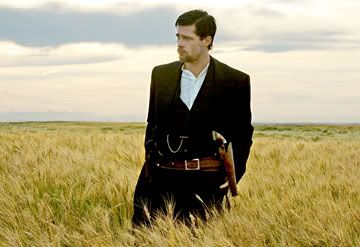

Archive: "The Assassination Of Jesse James By The Coward Robert Ford" (2007)
The current Western revival continues with "The Assassination of Jesse James by the Coward Robert Ford," but don't expect another action-oriented "3:10 to Yuma." This is a broody, meditative Western; it's sprawling in the way the vast, empty, and endless prairie is, a landscape which the movie peers out upon quite often. It also peers deeply into the depths of its two center characters, the famed outlaw Jesse James (Brad Pitt) and the man who ended his life, Robert Ford (Casey Affleck). It's a haunting retelling of one of the most renowned outlaw sagas, and it's a dark, psychological take on a timeworn genre. It's gorgeous both in its admiration of the Western iconography and the inner complexities of its characters.
The movie opens at the start of Jesse James' decline. It is 1881, and the James Gang has only one robbery left to go. Jesse has been a legend for some time now, and he's living a double life, being a ruthless killer and an attentive father and husband at the same time. It's finally beginning to wear down on him, and the legend is growing old. The remaining gang members are Jesse's older brother Frank, Robert's older brother Charley Ford, Jesse's cousin Wood Hite, and an outlaw named Dick Liddil. And then there's the 19-year-old Robert Ford, who weasels his way into the train-robbing group. Robert is fascinated by Jesse and his fame; Robert reads about Jesse in dime novels and devoutly idolizes him. Jesse recognizes this and at one point asks Robert, "Do you want to be like me, or do you want to be me?"
All the other gang members also recognize that Robert is Jesse's starstruck stalker. Robert is clingy and like a needy puppy who is easily bossed around and hurt, but also has a fighting spirit. I can't help but wonder, though, that maybe he wanted more than just to be like Jesse. Robert's admiration turns into near lust. Does he feel more for Jesse? And why does Jesse put up with him as he does? It's like they're doing a provocative dance of death, and they each know it; you can see it in their silent glances. Maybe Jesse knows that his time has finally come and that allowing Robert into his life will finally close the deal. Robert doesn't openly accept the task of killing the legend; it's a task handed to him that carries a much bigger burden than he first expects.
After a series of murders, deceptions, corruption, lies, and turnovers, Robert Ford and Jesse's cousin find themselves staying in Jesse's home with his wife and kids. And then comes the moment in the parlor when Jesse removes his guns, stands up on a chair, and turns his back to Robert in order to fix a picture hanging on the wall. Jesse doesn't adjust the picture because it needs adjusting; he adjusts it because he knows and Robert knows, just like we know from reading the title, that the time has come. Does Jesse openly accept his death? Maybe not, but he was definitely flirting with the idea of it. And through, as the title says, "assassinating" Jesse James, Robert Ford believes he might be able to find something for himself.
Robert Ford, however, spends the majority of the rest of his life literally reenacting the day he killed Jesse James in front of paying audiences. The fame he sought after turns out to be bitter, and nobody appreciates him for his supposed good dead. The title calls Robert a "coward" and so does everybody in the movie. Jesse is seen as the victim, a man torn against himself, his fame, and his inevitable end, but Robert is also given sympathy as a man who was driven to essentially kill the man he loves.
The cinematography is done by Roger Deakins who uses the empty expanse of the West to draw on an ominous feeling with moody skies and tall grasses where light and shadows bend; he fits the mood and will probably be doing the same thing in the forthcoming Coen Brothers movie, "No Country for Old Men." The movie is a poetic saga in sorts as it uses the open prairie landscape to its advantage. There's also a spine-tingling score by Nick Cave and Warren Ellis that emphasizes the film's nervy style as the music issues an eerie and lingering emotional disturbance.
You would hardly recognize Brad Pitt playing Jesse James as this is his maturest role yet; he plays the character so sublimely that you would think he has been living the character all his life. Casey Affleck pulls his weight, as well, playing the kid; he's strangely convincing with his awkward eye shifts and downward stares. You know you're watching good actors when you can tell something profound is going on inside their minds even when they don't speak it. Yes, the movie is 2 hours and 40 minutes long, and yes, it does feel long when you're watching it. "The Assassination of Jesse James by the Coward Robert Ford" is long-winded just like its title; however, an epic like this is almost required to be long so that the ending moment, when it finally arises, is more rewarding. The only feeling of pretension comes from the intrusive narrator who could've been left out because this is a movie that has the ability to speak for itself.





No comments:
Post a Comment